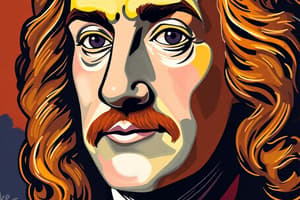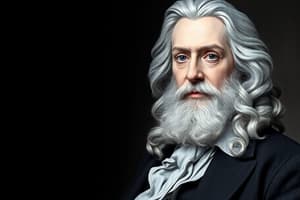Podcast
Questions and Answers
What did John Locke believe about natural rights?
What did John Locke believe about natural rights?
Natural rights do not come from the government.
What action could be considered an acceptance of the social contract?
What action could be considered an acceptance of the social contract?
Driving on the highway.
According to Baron de Montesquieu, what is lost if one person has too much power?
According to Baron de Montesquieu, what is lost if one person has too much power?
Freedom.
What did Enlightenment philosophers believe could answer questions and solve problems?
What did Enlightenment philosophers believe could answer questions and solve problems?
How did Hobbes's views on human nature differ from Locke's?
How did Hobbes's views on human nature differ from Locke's?
What natural rights did John Locke argue all humans are born with?
What natural rights did John Locke argue all humans are born with?
Under what circumstances did John Locke believe it was acceptable for people to overthrow the government?
Under what circumstances did John Locke believe it was acceptable for people to overthrow the government?
What concept did John Locke help develop between citizens and the government?
What concept did John Locke help develop between citizens and the government?
Why did Montesquieu advocate the separation of powers?
Why did Montesquieu advocate the separation of powers?
How did John Locke view humans?
How did John Locke view humans?
Flashcards
Locke's Natural Rights
Locke's Natural Rights
Natural rights are not granted by government; they are inherent to all humans.
Social Contract Acceptance
Social Contract Acceptance
Following societal rules (e.g., driving laws) shows agreement to the social contract.
Montesquieu and Power
Montesquieu and Power
Excessive power in one person or group leads to loss of freedom.
Enlightenment's Solution
Enlightenment's Solution
Philosophers believed human reason could solve problems.
Signup and view all the flashcards
Hobbes vs. Locke on Humanity
Hobbes vs. Locke on Humanity
Hobbes saw humans as naturally violent, Locke as naturally reasonable.
Signup and view all the flashcards
Locke's Natural Rights
Locke's Natural Rights
Locke believed humans are born with rights to life, liberty, and property.
Signup and view all the flashcards
Overthrowing Govt. (Locke)
Overthrowing Govt. (Locke)
Governments can be overthrown if they violate the social contract.
Signup and view all the flashcards
Social Contract (Locke)
Social Contract (Locke)
An agreement between citizens and government defining their roles and responsibilities.
Signup and view all the flashcards
Separation of Powers (Montesquieu)
Separation of Powers (Montesquieu)
Dividing governmental power among different groups to prevent abuse.
Signup and view all the flashcards
Locke's Human Nature
Locke's Human Nature
Locke believed humans are naturally reasonable.
Signup and view all the flashcardsStudy Notes
John Locke and Natural Rights
- John Locke posited that natural rights are inherent and not granted by the government.
- He identified life, liberty, and property as fundamental rights.
- Locke believed that every individual is born reasonable and capable of rational thought.
Social Contract
- The concept of the social contract involves an implicit agreement between citizens and the government regarding rights and responsibilities.
- Individuals implicitly accept the social contract by abiding by rules, such as driving on highways.
- Locke argued that citizens have the right to overthrow their government if it breaches this social contract.
Philosophers and Reason
- Enlightenment philosophers placed great faith in human reason as a tool to understand the world and resolve societal issues.
Views on Human Nature
- John Locke's perspective on human nature suggested neutrality, asserting that people are not inherently good or bad.
- In contrast, Thomas Hobbes held a more pessimistic view, believing that humans are naturally violent and self-interested.
Montesquieu and Separation of Powers
- Montesquieu advocated for the separation of powers within government to prevent any single entity or individual from accumulating excessive power.
- He posited that liberty is endangered when legislative and executive powers are held by the same entity, leading to potential tyranny.
Studying That Suits You
Use AI to generate personalized quizzes and flashcards to suit your learning preferences.




